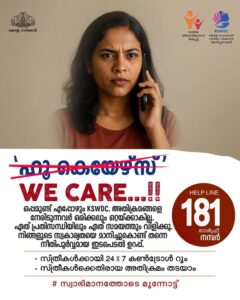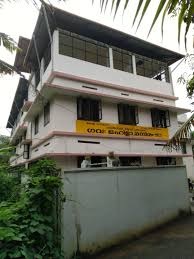Published Nov 28, 2025 | 8:00 AM ⚊ Updated Nov 28, 2025 | 8:00 AM

Despite repeated campaigns, helplines, and promises of protection, domestic violence continues to rise.
Synopsis: One Stop Centres are state-sponsored institutions to help women in need, especially when they face abuse. In theory, these initiatives create a strong support network. However, a study noted that these centres are functioning improperly in Kerala, Telangana and Andhra Pradesh.
Never give up on life, urged Kerala Health Minister Veena George as she shared the Women’s Development Corporation’s 181 helpline, reassuring that support exists for those facing threats, abuse or betrayal.
Her social media post — emphasising that “we care” when someone says “who cares” — carried a clear political echo as well, especially after MLA Rahul Mankootathil, who was suspended from the Congress, dismissed the sexual harassment accusations against him with the same phrase.
The message became both a rallying cry and a pointed response to his insensitivity.
Yet, beneath the strong words and new initiatives lies a sobering reality. Despite repeated campaigns, helplines, and promises of protection, domestic violence continues to rise. For many women, little has changed where it matters most, on the ground, inside their homes, and in their daily struggle for safety.

Snehitha Shelter at Kakkanad, Kochi
Kerala has a wide range of mechanisms in place to assist women facing violence, from central schemes like One Stop Centres, Mahila Mandirams, Mitra helplines and Women Protection Officers under the Domestic Violence Act, to state-funded programmes like Awasanidhi.
Women can also turn to the Health Department’s Bhumika initiative, Kudumbashree’s Snehitha centres or the Seethalayam programme run by the Homoeopathy Department.
In theory, these initiatives create a strong support network.
The Centre for Public Policy Research (CPPR), which works with various governments and institutions to develop policy recommendations, has conducted a detailed study on the existing gaps.
According to their findings shared with South First, only a limited number of women actually access these services. Low awareness, combined with social pressure to adjust within marriages, discourages many from reporting abuse.
The National Family Health Survey-5 (NFHS-5) data underscores this reality: 57 percent of women who face domestic violence never seek help, and 19.3 percent speak to someone but avoid approaching formal institutions.
The NFHS data also revealed an intergenerational pattern. Women whose mothers experienced violence are more than three times more likely to be in abusive marriages themselves, indicating how deeply normalised this cycle has become.
Speaking to South First, Beena Santhosh (name changed), a native of Ernakulam who sought refuge at the Snehitha shelter home, recounted her experience.
”I was not even aware that such centres existed. One night, when my husband beat me after a violent altercation and the neighbours called the police, it was the police who took my child and me to the Snehitha shelter. Only then did I realise that there was a space I could go to, even if only for a few days.
Had I known earlier, I would have left my husband’s house long ago. The biggest problem is that after marriage, we women often have no place we can truly call our own.”

Health Minister Veena George shared the 181 helpline, assuring support for those facing abuse.
The CPPR has released a detailed study highlighting the disturbing rise of domestic violence in Kerala. Despite the state’s reputation for social progress, police statistics reveal that between 2022 and 2024, Kerala registered around 18,500 crimes against women each year.
By July 2025, another 11,000 cases had already been reported.
Domestic violence accounts for a significant share of these crimes, with annual figures ranging between 4,500 and 5,000 from 2021 to 2024. More than 2,000 cases were recorded in just the first seven months of this year.
CPPR points out that institutional weaknesses further limit the effectiveness of these services. Poor planning and underutilisation of funds, along with weak interdepartmental coordination, slow down the state’s response to gender-based violence.
Training for frontline responders, such as police, public prosecutors, healthcare providers and staff at One Stop Centres, remains inconsistent. The study notes that many men avoid gender-sensitisation sessions, assuming they are intended only for women. CPPR stresses that training must be mandatory, gender-neutral, and connected to performance appraisals.

Govt Mahila Mandiram in Kallara, Kottayam
One of the most striking observations in the CPPR study is the absence of structured feedback systems across institutions that deal with gender-based violence. Without feedback from survivors, it is difficult for departments to understand gaps in service delivery or to build trust among women who hesitate to seek help.
CPPR argues that establishing regular feedback mechanisms would help refine services and encourage more survivors to come forward.
The study underlined that any meaningful change must go beyond institutional reforms and address gender norms directly.
CPPR recommended targeted programmes in schools and colleges to engage boys and young men in conversations about gender roles, respect in relationships and harmful social conditioning.
It said these initiatives must be backed by dedicated budgets from the Departments of Women and Child Development and Education.
At the same time, it noted that Kerala needs to foster a culture where bystanders do not remain passive witnesses when they see a woman in distress. Encouraging responsible intervention, the study argues, is critical to breaking the silence around domestic abuse.
Speaking to South First, Anu Maria Francis, a Senior associate in Research and Project Management, said that they conducted a study on ”Strengthening Institutional Mechanisms Combating VAWG ” across five states — Goa, Kerala, Telangana, Rajasthan and Jharkhand.
As part of this broader study, an assessment of the One Stop Centres (OSCs) was carried out in Kerala, Telangana and Andhra Pradesh. Some of the major findings of the Study are:
She added that, being a district-level mechanism, accessibility is an issue. In Kerala, OSCs mostly receive informal support from ASHA and Anganwadi workers for referrals of cases to them. There is no mechanism in place for the OSC Centres to track case progress once they are handed over to the judicial system.
This prevents the OSCs from maintaining records of the number of FIRs filed, the status and adherence of Protection Orders (PO), and the conviction and acquittal rates of the accused.
Anu further explained findings from individual states. In Telangana, 36 OSCs are functional and are outsourced to NGOs for their operations. Also, the absence of a police facilitation officer at the OSCs hinders survivors from receiving police assistance for filing FIRs.
In Andhra Pradesh, 26 districts have operational OSCs. However, the OSCs in Guntur, Anantapur, and NTR districts lack in-house psychosocial counsellors.
In Andhra Pradesh, the DLSA Secretary conducts monthly visits to the centres to evaluate the requirements of survivors who wish to move their cases to court. However, it was noted that centres prioritise mediation between the survivor and the perpetrator, particularly in cases of domestic violence and dowry harassment, over taking legal recourse.
She added that, hence, there is a bias towards mediation and compromise settlements in most OSCs. Fund delays, causing salary arrears and out-of-pocket expenses, are common in all states.
Often, inclusivity is undermined, as ramps and other accommodations for the disabled are not available in most OSCs. OSCs are usually approached by women aged 18–50 years. Senior women are not approaching the OSCs.
(Edited by Muhammed Fazil.)

